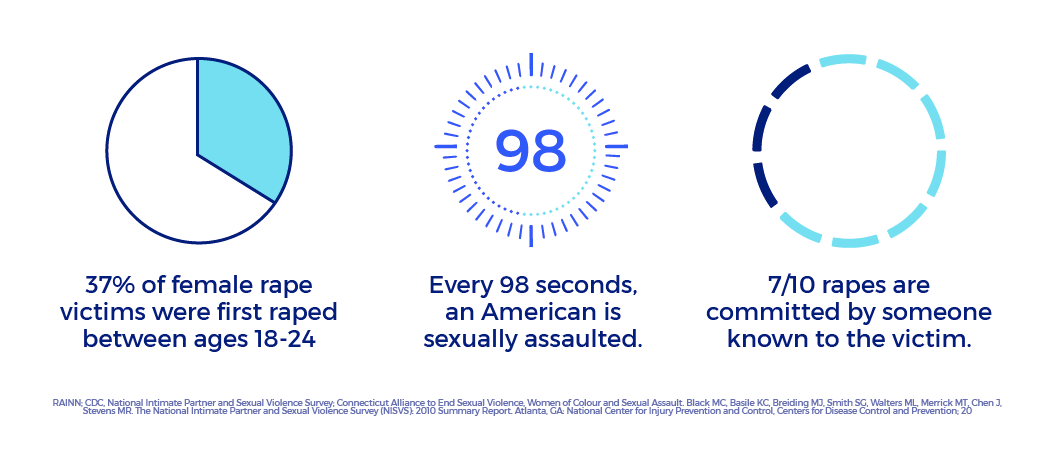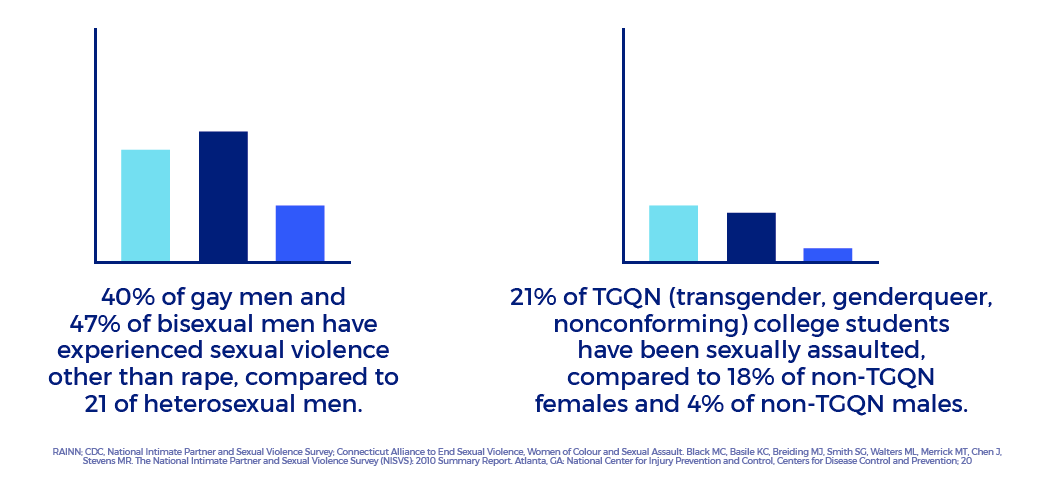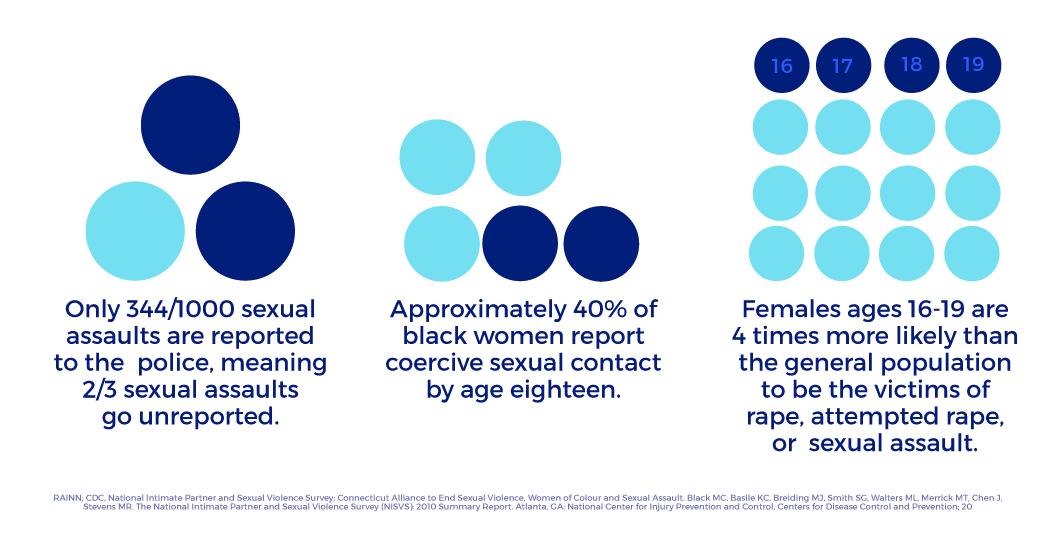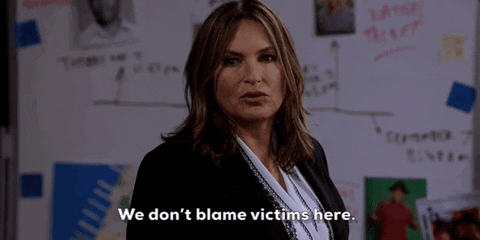
Sexual Assault
In partnership with The Equality Institute
Note: We know this is pretty lengthy, but the information is extremely important. If you have trouble getting through this content based on personal experience, please take the care you need and consider the resources listed below.
There are a lot of statistics when it comes to sexual assault. It’s important to remember that behind each number is a real life human being living with the trauma of an intimate violation. Be kind to yourself and to others when it comes to conversations about sexual assault and trauma. We could all stand to benefit from better boundaries, mutual respect and consent, and believing and supporting survivors.
Let’s talk about sexual assault
-
So what exactly is sexual assault? According to the Department of Justice sexual assault is defined as “any type of sexual contact or behavior that occurs without the explicit consent of the recipient.” Sexual assault can include a wide range of acts including:
Sexual harassment
Unwanted touching
Coerced or forced sexual activities
Flashing
Stalking
Posting sexual images online without consent
Being forced or coerced to watch pornography
The most important factor is that sexual assault happens when consent is not present. Consent is an agreement between people to engage in sexual activity. Consent is not implied, not coerced, and not set in stone. Consent is voluntary, specific, informed, enthusiastic, positive and reversible (i.e. you can change your mind at any time). It is all about open, ongoing communication.
Lack of consent can happen in a lot of ways, including ‘forced sex’ and ‘coerced sex.’ Sometimes people could be verbally or physically forced into sexual activity against their will. People could also be coerced or convinced into sexual activity that they don’t want to do. Force and coercion can happen in a variety of ways. For instance, being forced to watch pornography is another form of sexual assault where consent isn’t given. There are many different forms of sexual assault, and it may not always feel obvious or comfortable to label something ‘assault.’ Pressure and guilt often play a major role in sexual assault; the bottom line is, if an experience was non-consensual, it was not okay. If you’re not sure about something, check out the resource list toward the end.
Sexual assault is one of the many forms of sexual violence, which is an umbrella term meaning any sexual act that is perpetrated against someone’s will. Sexual violence is a form of power-based violence and includes a range of crimes such as sexual assault, rape, and sexual abuse. Here are some helpful terms related to sexual violence and assault:
Rape: often used as a legal definition to specifically include sexual penetration without consent.
Intimate partner violence: behavior within an intimate relationship that causes physical, sexual, or psychological harm.
Sexual harassment: an unwelcome sexual advance, unwelcome request for sexual favors, or other unwelcome conduct of a sexual nature.
Stalking: a pattern of repeated and unwanted attention, harassment, contact, or any other course of conduct directed at a specific person that would cause a reasonable person to feel fear.
Stealthing: the act of removing a condom during sex without consent of the partner.
Revenge porn: often nude or sexual photography or video that is distributed without a person’s consent via any medium.
Many of these terms are defined specifically according to state. To find out your state’s definitions, visit RAINN’s State Law Database.
-
Myth #1: If the assaulted person was drunk or wearing provocative clothing, they’re at least partially responsible.
Fact #1: Sexual assault survivors are never, under any circumstances, responsible for somebody assaulting them. Neither behavior nor dress is an invitation for non-consensual sexual activity.
Myth #2: Sexual assault is perpetrated mostly by strangers.
Fact #2: Most sexual assaults and rapes are committed by someone the survivor knows – this may be a friend, a relative, a person in a position of authority, or a partner. The most common form of violence against women across the world is violence that occurs in an intimate relationship.
Myth #3: Sexual assault can be avoided if people avoid “dangerous” places where strangers might be lurking.
Fact #3: Sexual assault can happen in many places at many times of the day. According to FBI data, nearly 70% of reported sexual assaults happened in the residence of the survivor, the perpetrator, or another person.
Myth #4: He’s a man – men can’t be sexually assaulted.
Fact # 4: People of any gender can be sexually assaulted, including men. Sometimes, men and boys who have been sexually assaulted face different challenges because of social attitudes and stereotypes about men and masculinity.
Myth #5: Victims often lie about being sexually assaulted to get attention.
Fact #5: In America, estimates of false reporting for sexual assault fall between 2% and 7% (which is about the same for other crimes, eg. Grand Theft Auto). This means that most sexual assault reports are genuine. Many survivors don’t report their experiences for fear of not being believed or supported.
-
Sexual assault is never your fault. Ever. After your assault, you may experience a range of emotions, from shock and confusion to sadness and anger. You may lose your appetite, have trouble sleeping, and/or feel detached from your body at times. You may feel shame, blame yourself, or question your recollection of the experience. All of these responses are completely normal, and there is no single correct or ‘normal’ response. Sexual assault is a type of trauma, and it takes time to for your mind and body to process your experience and heal. This time period varies for each individual. Acknowledge your experience and feelings as real and legitimate.
You may wonder why this happened to you, but rest assured, sexual assault is never the consequence of your actions or behaviors. The sole responsibility lies on the perpetrator. Know that you are not alone, and that there are resources available to help you cope, including therapy and group counseling.
If you are in immediate danger or seriously injured, call 911. Your safety is important. Are you in a safe place? If you’re not feeling safe, consider reaching out to someone you trust for support. You don’t have to go through this alone.
-
It isn’t always easy for survivors to speak up or report sexual assault. They may…
not want anyone to know
believe that it is a personal matter
believe that it was not important enough to report
not be sure if what they experienced was sexual assault or rape
believe that the police would not believe them or do anything
fear retaliation from the perpetrator
not want to get the perpetrator in trouble (especially if the perpetrator is someone they know or are in a relationship with)
You have complete control over your decision to report. If you choose to do so, learn your state laws, and familiarize yourself with the process.
-
It can be difficult to accept that a loved one has been sexually assaulted or abused. Their choice to confide in you represents a level of trust you should feel proud of, but that doesn’t mean it’s an easy conversation or journey through coping. Here are a few steps you can take to be supportive.
Listen to and validate their experience. Recognize their experience and feelings as valid. Listen more than you speak. Let them open up to you in a way that is natural for them; do not push the conversation or their comfort zone. Thank them for opening up to you, and emphasize that you can be trusted, and you respect their privacy (and mean it!). Don’t ask for details, and never ever victim-blame. Sexual violence is never the fault of the survivor. Do not label their experience for them. Allow them to come to terms with their experience in their own way.
Don’t tell them what to do. You may have opinions about what your friend should do next (go to the hospital, report to the police, tell a parent, etc.), but what matters most is how they want to handle the situation. Their choices are entirely up to them. You can point your friend to available resources, and encourage them to confide in a mental health professional, but never pressure them. Respect their privacy and right to make their own decisions.
Take care of your own mental health. Learning about someone’s sexual assault can be painful, as you care about that individual and may feel sad or angry they have been hurt. It can also be triggering if you have had your own experience(s) with sexual trauma. However, remember that you are not a therapist or licensed professional equipped to counsel your friend/relative. Establish necessary boundaries for yourself, and be realistic about what you can, and cannot handle.
Overall, be sensitive and patient, but continue to be yourself. Sexual violence is a traumatic experience, and everyone handles it differently. At the end of the day, survivors want to feel validated, respected, and normal. Treat them as such.
-
National Sexual Assault Hotline (800-656-HOPE):
When you call the National Sexual Assault Hotline, a staff member will walk you through the process of getting help at your own pace. You’ll be connected to a trained staff member from a local sexual assault service provider in your area. They will direct you to the appropriate local health facility that can care for survivors of sexual assault. Some service providers may be able to send a trained advocate to accompany you. The hotline is free, confidential and available 24/7.
RAINN:
RAINN is the nation’s largest anti-sexual violence organization. It provides a wealth of information and resources on a huge variety of topics such as safety, receiving medical attention, recovery, reporting options, the criminal justice system and many more. You can also chat online at RAINN anonymously and confidentially.
End Rape on Campus:
You can also contact End Rape on Campus. As stated on their website, the violence prevention advocacy and awareness organization provides free, direct assistance to all survivors of gender-based and sexual violence, including, but not limited to, in the following ways:
connecting survivors, parents and friends with support networks
filing federal complaints
mentoring student activists
connecting survivors with mental health professionals
connecting survivors with legal counsel
Local services:
There are many services available to people who have experienced sexual assault such as the 24-hour crisis line, follow-up services, legal services, medical and mental health services, support and peer groups. Survivors and loved ones can also find support in their communities by reaching out to a local sexual assault service provider.
Other resources include:



A culture problem
-
Rape culture is a term, coined by feminists in the 1970s, to refer to the normalization or trivialization of sexual violence against women in society. Rape culture manifests in many different ways. It is victim blaming, slut shaming and sexual objectification. It is how the threat of sexual violence affects women’s daily movements. It’s the fact that survivors of rape are often asked, “What were you wearing? What did you say? How much did you drink?” It encourages male sexual aggression and condones physical and emotional violence against women as the norm. Rape culture is when people make jokes about sexual violence that validate the actions of perpetrators. Or when perpetrators of sexual violence are defended because they are athletes, actors or musicians. It is a culture that exists across the world and condones sexual assault.
-
Recently, the media has turned its attention to college and university campuses as the sites of widespread rape culture and sexual assault. While college can be an overwhelmingly positive and eye-opening experience, it is important to understand that it is also a setting for risk. A 2016 Bureau of Justice Statistics funded study of 9 U.S. colleges and universities found that over a quarter of senior females (25.1%) reported experiencing an unwanted/nonconsensual sexual encounter since entering college. Students who experience sexual assault tend to face subsequent trouble with schoolwork, relationships, and thoughts of transferring or dropping out of school. Being educated and knowledgeable about sexual health, consent, your rights and resources can go a long way in making the college experience all the more amazing.
-
Title IX is a federal civil rights law that prohibits discrimination on the basis of sex, which includes sexual harassment, rape, and sexual assault. Any college or university that receives federal funding (most of them) can be held legally responsible if they ignore sexual harassment or assault. Under Title IX, students can take actions against their assailants through their college and hold them responsible for their actions. Get to know Title IX, and your rights under it as a college student.
-
A bystander is a person who is present when an event takes place but isn’t directly involved. They may be present when sexual assault occurs, or may witness the circumstances that lead up to the crime. Being an active bystander means that by stepping up and stepping in, you could change a potentially dangerous outcome.
Whether you’re taking home a friend who has had too much to drink or explaining that a rape joke isn’t funny, choosing to be an active bystander can affect the way those around you think about and respond to sexual violence.
Trust your gut and take initiative. If you see someone who might be at risk, ask if they need help, or enlist friends/people nearby (bartender, bouncer, RA) to help step in. You can directly confront the harasser/assaulter, but proceed with caution. Helping a potential victim is the top priority.
If you are in a potentially dangerous situation that involves illegal drugs or underage drinking, do not be afraid to ask an adult for help. You might be afraid of getting in trouble, but your safety (and the safety of others) is significantly more important.
If you cannot help a person in the situation, you can do your part by confirming their story (if asked to be a witness), believing, and supporting survivors.
tabú tip ❥
tabú tip ❥
Educate and empower yourself! Having knowledge and information about sexual assault goes a long way in protecting yourself and those around you. Sexual assault doesn’t look like one thing, nor does recovery. Know your rights and the resources available, and be an active part in reducing sexual assault by being informed and supporting others!
More Resources
Because we love you! 🥰




“Their time is up!”